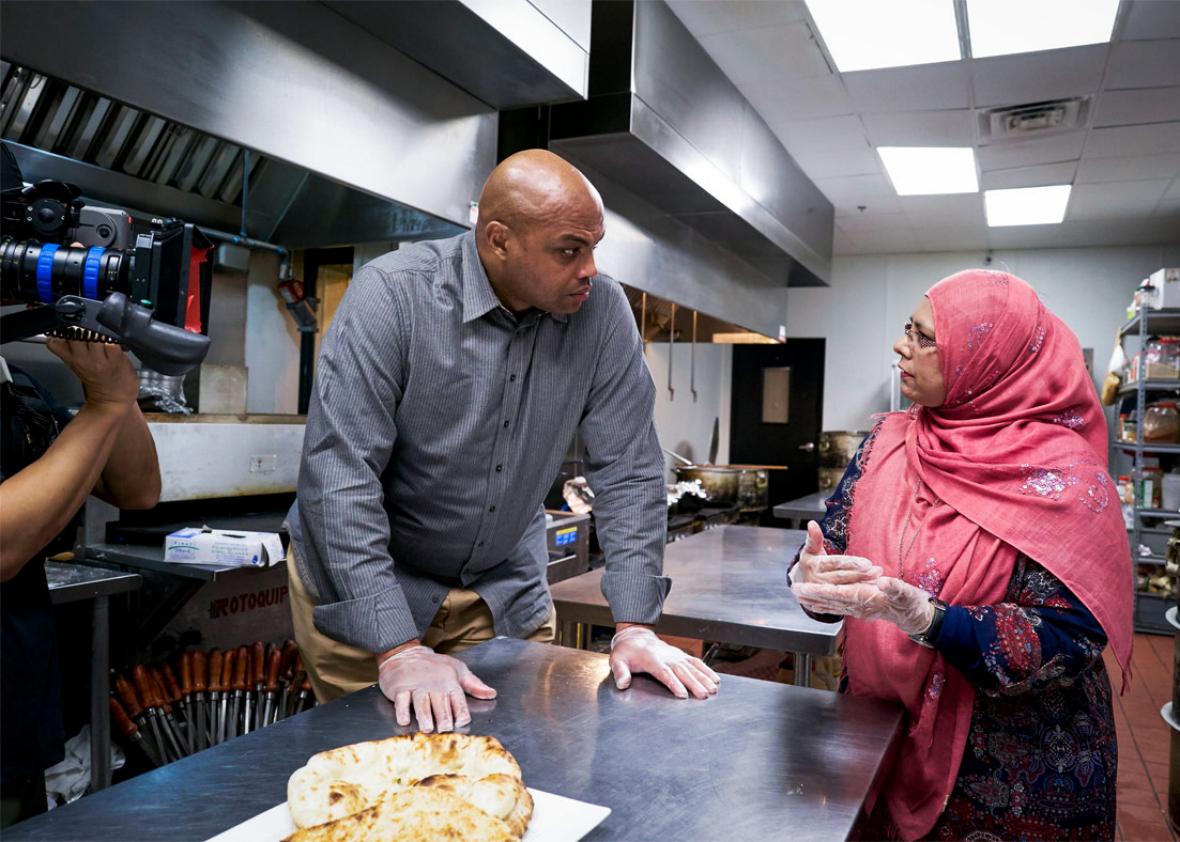In American Race, Charles Barkley’s new TNT docuseries on race that nobody asked for, the former NBA MVP is on a mission. He insists we need to have a “dialogue” about race, now. He is asking the deep questions: What does it mean to be a Muslim American in these times of increased anti-Muslim sentiment? Now that Donald Trump is president and the U.S. is experiencing a deep political and cultural divide, what forces are keeping us apart? And, of course, as he eloquently puts it, “What the hell happened in Baltimore?”
If you’re at all familiar with Barkley’s public persona, you probably know that he isn’t exactly the deepest of thinkers. In interviews and as co-host of Inside the NBA, he has a tendency to speak rashly first and dig his heels in when called out—“Say what you feel, and then if I have to explain a little bit later, I can do that,” as he aptly described himself in a 2015 profile for the Undefeated. But for all of Barkley’s ostensible inquisitiveness, this four-episode exercise in pedestrian conversations comes off like Social Studies 101. The show leads with basic, often loaded questions (“If Islam is truly a religion of peace, where are the terrorists coming from?”), and through its vessel, Barkley, fails to reveal anything new to anyone who doesn’t get their news primarily off Facebook.
As a host and narrator, Barkley appears stiff and awkward in his direct-address vignettes, even though he’s espousing his own point of view—proof that he’s most comfortable when he doesn’t actually have to think about what he’s saying ahead of time. As an interviewer, he lacks the ability to challenge his own assumptions, preferring to lead with them and allow them to guide where the conversation goes. Take his interview with Beth Van Duyne, the fear-mongering Irving, Texas, mayor who has been a vocal opponent of local Muslims seeking to establish tribunals for mediation within their community. Van Duyne, now a regional administrator for Trump’s Department of Housing and Urban Development, tells Barkley, “I have no idea what the tribunal was trying to do.” She then proceeds to cite details from the tribunal’s website. Barkley doesn’t ask the obvious follow-up: Why hasn’t she bothered to actually speak to any of the imams personally so she could understand what they were “trying” to do? Charles Barkley isn’t a reporter. But he is all about following state and federal laws and is not down with “separate laws.”
The playing-up of Barkley’s ignorance is surely supposed to make him “relatable” to those who, like him, haven’t even done cursory research ahead of time. (“Is there anyone [in Hollywood] trying to portray minorities accurately?” ponders Barkley, as if this hasn’t been a driving question in the past decade or more of popular culture, as if Shonda Rhimes never existed.) This approach can admittedly be useful in some instances; when interacting with people from races and cultures other than his own, he seems to be genuinely receptive to their points of view, precisely because he’s working from a completely blank slate. (To his credit, unlike Van Duyne, Barkley actually does go and speak to an imam, as well as other Muslim residents in Irving.)
But his ignorance is especially damaging when he’s interacting with some of his black interview subjects. In the first episode, in which Barkley asks what the hell happened in Baltimore, the Barkley who’s exasperated every viewer who isn’t an apologist for respectability politics comes out in full force. “I understand and support Black Lives Matter,” Barkley says in voice-over. “But I’ve always thought it was stupid to destroy your own neighborhood.” It’s that but that says it all—a dissonance that turns a blind eye to the notable connection between cause and effect that has been pointed out countless times before, by the likes of Michelle Alexander, Ta-Nehisi Coates, and many others. The mother of a Baltimore activist, who agrees that some of the protests went too far, still takes issue with Barkley’s use of the word scumbags to refer to the protesters in Ferguson the year before. Barkley’s takeaway? “We can agree to disagree.”
His reaction is essentially the same in what is undoubtedly the series’ most explosive and compelling moment, which is saying something about a series that features an interview with Richard Spencer. In the final moments of Episode 1, Barkley attends a town hall meeting and soon begins to trot out his “What about black-on-black crime?” shtick. (“We have to look at ourselves in the mirror,” he once said. “There is a reason that they racially profile us in the way they do. Sometimes it is wrong, and sometimes it is right.”) The Baltimore residents aren’t having it. The mother of Tyrone West, a man who died in police custody under suspicious circumstances, fiercely and eloquently expresses her pain and disdain for Barkley, who can only stutter intermittently that he’s “just trying to start a dialogue.”
It’s satisfying to see such a dressing down, though it’s clear that by the end of the episode, he still doesn’t see the problem with his views. He’s just trying to start a dialogue, but when you’re the “I’m just asking questions” guy, you ought to push for something beyond easy answers. (If you’re looking for a cable news documentary that addresses race in a thoughtful way, CNN’s United Shades of America is a better use of your time.) One need only turn on TNT after an NBA game or comb through years of exasperating interviews to hear Barkley speak in platitudes about how everyone just needs to start treating each other with more respect. (Except for black people, who need to start respecting themselves.) More likely than not, the only thing American Race will challenge is your willingness to listen to Charles Barkley for four hours.
